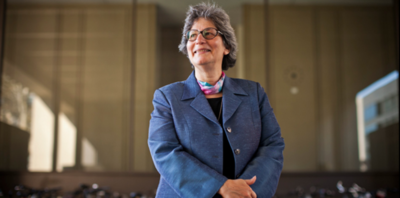PAOC Spotlights
Solomon is 2017 National Academy of Sciences Medalist
Susan Solomon, the Lee and Geraldine Martin Professor of Environmental Studies at the Massachusetts Institute of Technology, will receive the 2017 National Academy of Sciences, Arthur L. Day Prize and Lectureship.

Solomon has been a leader in the fields of atmospheric chemistry and climate change for three decades. In 1986, Solomon proposed that novel chemistry was taking place and then used optical techniques to demonstrate that chlorine and bromine released by chlorofluorocarbon (CFC) gases were responsible for the ozone “hole” over Antarctica, which had been discovered just a year earlier. This groundbreaking work has now become standard text in any description of stratospheric ozone processes. Her findings contributed to the establishment of the Montreal Protocol to reduce emissions of CFC gases beginning in 1987. Thirty years later, Solomon used observations and model calculations to identify the first signs of the recovery of the Antarctic ozone layer, an indication of the progress and effectiveness of the Montreal Protocol.
In addition to her personal scientific contributions, Solomon has served as a co-chair of the Intergovernmental Panel on Climate Change Working Group I, leading an effort of hundreds of authors and reviewers for the 2007 IPCC international climate assessment report. Throughout her career, she has also worked to communicate the science of climate change to the public and to policymakers.
The Arthur L. Day Prize and Lectureship is awarded to a scientist making lasting contributions to the study of the physics of the Earth and whose lectures will provide solid, timely, and useful additions to the knowledge and literature in the field. The recipient is awarded a $50,000 prize and funds to present a series of Day Lectures, supported by the Arthur L. Day Bequest.
The winners will be honored in a ceremony on Sunday, April 30, during the National Academy of Sciences' 154th annual meeting.
The National Academy of Sciences is a private, nonprofit institution that was established under a congressional charter signed by President Abraham Lincoln in 1863. It recognizes achievement in science by election to membership, and — with the National Academy of Engineering and the National Academy of Medicine — provides science, engineering, and health policy advice to the federal government and other organizations.
Some of Solomon's findings include observing the first signs of Antarctic ozone healing and that short-lived greenhouse gases cause centuries of sea-level rise.